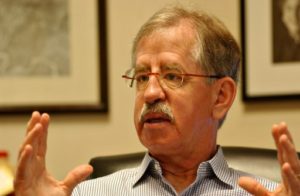Freddie Campbell was a dear friend, a confidant and someone with whom I could discuss just about anything.
He died the other day, apparently of complications from cancer. I struggled a bit over how I want to remember Freddie. I came up with something to share, so … here goes.
We worked together for nearly 11 years at the Beaumont Enterprise. I ran the editorial page, Freddie was the paper’s IT guru, the guy who kept the main-frame computer system running.
My day started the same way practically every day once Freddie and I became acquainted. I would go to work, read the paper (which was required of us) and start planning the day’s tasks.
Then Freddie would amble into my office. He would sit down and we then would begin discussing the news of the day. Later on, as often as not, the news involved the then-president of the United States, Bill Clinton. Freddie hailed from Little Rock, Ark., so he was quite familiar with the president. He didn’t think much of Bill Clinton and was unafraid to express his dislike to me. I had a different view of the 42nd POTUS. We would tussle, argue, even get our dander up. He then would get up and go about his day.
The routine would repeat itself the next day and days after that.
Freddie was a good man. He was smart and came from a family steeped in newspaper tradition. He was so very proud of his daughter and the woman she became.
But curiously, though, our friendship hit the rocks in recent years. We lost touch with each other because in the current toxic environment that has poisoned so many relationships, we couldn’t argue our points and then move on.
I regret deeply that our friendship soured.
Rather than talk any more about that, though, I am going to recall the joy we both felt in working for a newspaper, the Beaumont Enterprise, that sought to report on the community, to offer perspective on where we believed was the right direction for the region we covered … and toiled diligently to ensure we could deliver the news each day.
Well done, Freddie Campbell.





